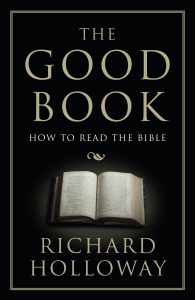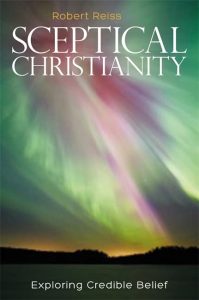Part 1 – A Chance Encounter
I recently had a serendipitous chance encounter that prompted me to think more about the many different ways Christianity can be expressed. I was on the ferry from Belfast to Cairnryan and it was rather busy, so I ended up sharing a table with an elderly couple. Not long into the voyage, they mentioned they were Jehovah’s Witnesses. I must admit, my first thought was, ‘Oh my word, I have to spend two and a half hours talking to Jehovah’s Witnesses. Where’s the nearest lifeboat?’ As it happened, we had a fascinating conversation about theology and the similarities and differences between what we believe. I respected their sincere conviction and boldness to strike up conversations with strangers. Despite their best efforts, it’s safe to say I won’t be joining my local Kingdom Hall any time soon, but I learned a valuable lesson about engaging with and respecting the beliefs of those I disagree with.
 In The Good Book: How to Read the Bible, Richard Holloway outlines three ways of interacting with Christianity. The first is to believe that every word of the Bible is the literal inspired truth, the second is to take a more critical view of the Bible while still affirming core doctrines, and the final way is to view the faith as a symbolic myth about the human condition. Interestingly, the third way is undergoing a contemporary resurgence; cultural commentators such as Jordan Peterson and Douglas Murray write extensively on the relevance of the Bible in modern society, even though neither of them believe in God in the conventional sense.
In The Good Book: How to Read the Bible, Richard Holloway outlines three ways of interacting with Christianity. The first is to believe that every word of the Bible is the literal inspired truth, the second is to take a more critical view of the Bible while still affirming core doctrines, and the final way is to view the faith as a symbolic myth about the human condition. Interestingly, the third way is undergoing a contemporary resurgence; cultural commentators such as Jordan Peterson and Douglas Murray write extensively on the relevance of the Bible in modern society, even though neither of them believe in God in the conventional sense.
As for me, I have a foot in each camp. Actually, that’s a terrible analogy because it implies I’ve got three feet – but you get what I mean. As I continue to explore the ever-changing nature of my faith, I find that I hold a pick-n-mix of beliefs from across the theological spectrum. On one hand this is a good thing, as it means I can attend just about any church and find enough in common with the teaching to get edification from it. Indeed, since leaving university I’ve moved around a lot and have attended very theologically different churches in Scotland, Switzerland and now England. However, the downside is that I don’t truly ‘fit in’ with any tradition.
In previous writings I have described myself as religious but not spiritual – that is, I get much meaning and fulfilment from religious practice but don’t often experience a supernatural connection with the divine. I have come up with a new axiom to further describe my religious outlook – I seek meaning from mystery. I want to discover a way that I can continue to be a Christ-follower who seeks meaning from the mysteries contained in scripture without having to change my naturally empirical way of thinking.
Part 2 – Sceptical Christianity by Rev. Robert Reiss
 I have just finished reading Sceptical Christianity by Rev. Robert Reiss, in which he seeks to create a “cleansed and healthy relationship with what I can truly and honestly believe with all my heart and mind”. That’s exactly what I hope to achieve one day. Reiss is Canon Emeritus of Westminster Abbey, and Sceptical Christianity is his account of how he interprets the core doctrines of Christianity in a manner inspired by the radical theologians of the 1960s. He tells the story of how, as a 20-year-old, he discovered Honest to God by John Robinson and found it ‘wonderfully liberating’. I had an uncannily similar experience at the same age, except for me it was Unbelievable by John Shelby Spong. Both written by Bishops no less!
I have just finished reading Sceptical Christianity by Rev. Robert Reiss, in which he seeks to create a “cleansed and healthy relationship with what I can truly and honestly believe with all my heart and mind”. That’s exactly what I hope to achieve one day. Reiss is Canon Emeritus of Westminster Abbey, and Sceptical Christianity is his account of how he interprets the core doctrines of Christianity in a manner inspired by the radical theologians of the 1960s. He tells the story of how, as a 20-year-old, he discovered Honest to God by John Robinson and found it ‘wonderfully liberating’. I had an uncannily similar experience at the same age, except for me it was Unbelievable by John Shelby Spong. Both written by Bishops no less!
Reiss starts with the central issue: how can we meaningfully talk about God? He suggests a bare minimum definition: ‘a force that wants to enable human beings to live together in a creative and loving way and to see the world as a context in which such love can develop’. Beyond that, theologians differ when it comes to defining the precise attributes of God. Classical theism sees God as the ultimate being who is all-powerful, all-knowing, all-loving, impassable and immutable. Such a view draws heavily on Hellenistic philosophy. Reiss leans more towards open theism, which centres around the idea that God is love, and love is inherently uncontrolling. One advantage of such a view is that it makes more sense of the problem of evil compared to classical theism. As Reiss puts it, ‘Perhaps God is not all-powerful in the way some would suggest, because any act of creation carries with it an element of risk, as any parent will know. Love is not all-powerful, and it can be thwarted’. I could write much more on the differences between classical theism and open theism, but that will have to be another blog post of another time.
One thing I appreciate about the book is that Reiss focusses on finding common ground across the theological spectrum, while also not being ashamed of his own radical views. Take the virgin birth for instance; regardless of how historically accurate one views the nativity narratives, there are certain underlying meanings that both conservatives and liberals can agree on. It emphasises how Jesus was no ordinary child, with the gifts brought by the wise men representing his theological significance and the visit to the shepherds emphasising how God sides with the margins of society. It may seem like reading the Bible in a symbolic manner is a very postmodern thing to do, but it has a surprisingly historic precedent – as early as the third century Origen wrote that there are three ways to understand scripture: literally, morally and allegorically. Some passages may be understood on all three levels, whereas others can only be interpreted on one level. There is room for amicable disagreement on what level of interpretation should be used for the birth narratives in Matthew and Luke.
Reiss takes a similar approach to the resurrection. He starts with a bare minimum approach: ‘The conviction central to the Christian Faith is that Jesus’ death as not the end… he remains a powerful force in the life of his followers today’. Beyond that, he lists several different ways in which theologians have interpreted the resurrection narratives and concludes ‘there are serious Christian men and women on all sides of the argument’. This final point is vitally important – it’s not helpful when people on either side of the theological divide accuse the other of not being truly Christian. We need to focus on what binds us together, that we are all seeking meaning from the same mysteries, even if our conclusions differ. An example of charitable disagreement can be found in Bishop John Inges’ review of Sceptical Christianity; he profoundly disagrees with the book’s arguments, but nonetheless writes ‘All that having been said, I am pleased that liberals such as Reiss can still find a home in the Church of England. It is good for us to be challenged by them’.
Part 3 – What Now?
So where does that leave me? As I said at the outset of this rather long and rambling post, I find myself caught between different traditions. I admire the convictions of the evangelicals and acknowledge the life-changing power of their salvation message. I also enjoy the ritual and artistic beauty of Anglo-Catholicism. I appreciate the hyper-rationalism of radical theologians like Reiss, as this is in line with my way of thinking. To quote Rev. Giles Fraser, ‘Personally, I think not fitting in has advantages. You’re not part of any club’. Yet it can also be a lonely position to be in.
Once a week I walk along the Sussex Cliffs to my nearest parish church for midweek eucharist. It is the most Anglo-Catholic church I have ever attended, quite a contrast from my last church, an evangelical parish in Switzerland. I take time out of the busy routine of working life to partake in a ritual that has been practiced for millennia, uttering the same words used by Christians across the globe. In that moment, I am part of something beyond myself, part of the ever-unfolding narrative of God’s engagement with the world.
My quest for meaning from mystery continues.
I suspect that if I had been there instead, it would have been the Witnesses looking for the lifeboat before too long.
Haha!
I had a chance to attend one of those big meetings of JWs years ago and I must say it’s actually been pretty pleasant. I’ve mostly done it for research (?) purposes, or satisfying my own curiosity, rather, and despite that I actually had a good time. Maybe we don’t share the exact same beliefs, and maybe we don’t follow the exact same word, but we all strive to just be the best we can in our own ways, right?
I know that JWs really seem to be looked down upon, but I think that by encouraging talking about God they give us a chance to talk about religion, which isn’t exactly too easy nowadays, at least not where I live. And they don’t really harm anyone with their beliefs, so… all is well, right?